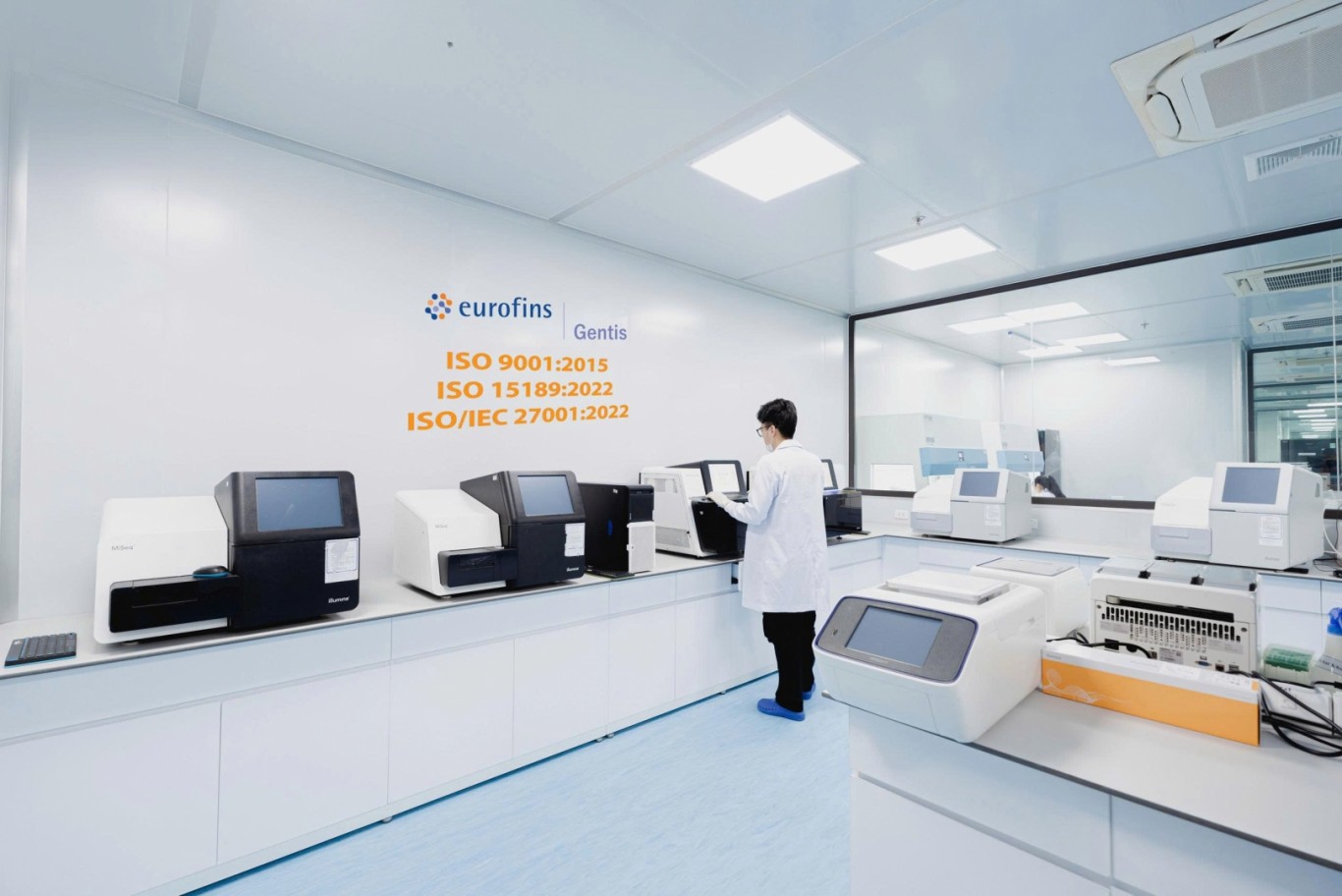The workshop was attended by leading experts, including Ho Manh Tuong MD., MSc, Head of the Assisted Reproduction Unit at My Duc Hospital and Secretary-General of Ho Chi Minh City Society for Reproductive Medicine, Prof. Nguyen Dinh Tao, PhD, President of the Assisted Reproduction Society, etc. And more than 200 delegates, including leading professors, obstetricians, embryologists, and leaders of assisted reproduction centers from leading hospitals, medical facilities, and testing centers nationwide, also participated.
The colloquium on Preimplantation Genetic Testing is a prestigious scientific event highly regarded by the medical community in the field of assisted reproduction. It is a reliable forum for experts, doctors, embryologists, and healthcare professionals to exchange, share, and learn from each other.
The workshop was divided into four sessions, with a total of 22 research papers presented in the plenary session and one poster presentation by leading experts nationwide. The presenters focused on discussing preimplantation genetic testing (PGT).
Opening Session I, Doan Thi Hang, MD, PhD, Deputy Director of Military Institution of Clinical Embryology and Histology, presented a paper on "The history of PGT development in Vietnam." In her presentation, Dr. Hang clearly outlined the history of PGT development worldwide and in Vietnam. The presentation pointed out that GENTIS was the first unit to introduce PGT to Vietnam by importing the first Illumina NGS system in 2013. By 2015, PGT was officially applied in Vietnam.
In 2023, GENTIS became the first unit in Vietnam to achieve ISO 15189:2012 for PGT-A testing services. With the development and advancement of science and technology, strategies for analyzing the genetic material of embryos are constantly being improved, thereby enhancing the quality of testing and the effectiveness of PGT in Assisted Reproduction.
 Dr. Doan Thi Hang, Deputy Director of Military Institution of Clinical Embryology and Histology, presented a report on "The history of PGT development in Vietnam."
Dr. Doan Thi Hang, Deputy Director of Military Institution of Clinical Embryology and Histology, presented a report on "The history of PGT development in Vietnam."
To ensure the quality of PGT testing, technical factors and technology are of paramount importance. This information was presented by Nguyen Quang Vinh, MSc, Director of the GENTIS Testing Center, in his report titled "Technical factors and technology in controlling and improving the quality of PGT testing."
Mr. Vinh stated that GENTIS is currently using Next-Generation Sequencing (NGS) technology from Illumina (USA) for PGT testing. The outstanding advantage is that it has been proven to have 100% accuracy compared to the aCGH method and detects mosaicism more effectively than aCGH (from 20% to 80%). Additionally, it offers higher resolution in detecting chromosomal structures compared to aCGH (detecting chromosomal deletions of up to 5 Mb; currently, it has been optimized to detect two more microdeletions of 2 Mb in size: 22q11 and 1p36).
 Nguyen Quang Vinh, MSc, Director of the Testing Center, presented a report on "Technical factors and technology in controlling and improving the quality of PGT testing".
Nguyen Quang Vinh, MSc, Director of the Testing Center, presented a report on "Technical factors and technology in controlling and improving the quality of PGT testing".
Additionally, the PGT laboratory must adhere to the ESHRE guidelines for PGT laboratory requirements, with a particular focus on sample transportation from the IVF center. Furthermore, the PGT laboratory must participate in the annual external quality assessment program of GENQA and obtain ISO 15189:2012 certification. All of these requirements are fully complied with and implemented by GENTIS to control and enhance the quality of PGT testing
 Assoc. Prof. Ho Sy Hung, PhD from Hanoi Medical University presented a report on "The application of PGT testing in the detection and screening of diseases in preimplantation embryos in Vietnam".
Assoc. Prof. Ho Sy Hung, PhD from Hanoi Medical University presented a report on "The application of PGT testing in the detection and screening of diseases in preimplantation embryos in Vietnam".
According to experts, PGT testing can be applied to detect and screen diseases in preimplantation embryos. This has been clearly presented by Assoc. Prof. Ho Sy Hung, PhD in his report. Dr. Hung stated that in Vietnam, PGT tests for screening genetic diseases such as PGT-M and PGT Max 1 are being increasingly optimized in terms of time and cost, giving more families with genetic diseases the opportunity to access this technology.
 Specialist level 1 doctor Nguyen Van Thong from Hung Vuong Hospital presented a paper on "Genetic counseling for transferring mosaic embryos."
Specialist level 1 doctor Nguyen Van Thong from Hung Vuong Hospital presented a paper on "Genetic counseling for transferring mosaic embryos."
The topic of counseling for transferring mosaic embryos, presented by Specialist level 1 doctor Thong, also attracted significant attention from the delegates. Dr. Thong suggested that counseling for mosaic embryos should prioritize factors such as the percentage of mosaicism in the biopsy sample, the number of chromosomes involved: 1 or more chromosomes, the type of chromosomes, complete or partial chromosome mosaicism, Monosomy or Trisomy type. Additionally, healthcare providers should provide multidisciplinary counseling and follow-up for embryos with mosaicism.
Furthermore, the conference featured numerous other scientific presentations, including
- “Choosing ICSI or IVF fertilization methods for PGT cases" by Nguyen Thi Cam Van, MD, MSc from Vinmec International General Hospital.
- "The efficacy of preimplantation genetic testing for aneuploidy (PGT-A) in patients with poor ovarian response” - M.S. Ho Thi My Trang at My Duc Phu Nhuan Hospital.
- “The future of preimplantation genetic screening for embryos at risk of gynecological cancer gene mutations: Potential and challenges.” - Nguyen Hai Phuong, MD, MSc at National hospital of Obstetrics and Gynecology.
These presentations provided healthcare professionals with updated knowledge about PGT and offered new perspectives on this testing method, enabling them to better support infertile couples.
As a pioneer in introducing PGT to Vietnam and a global partner of major companies like Illumina (USA), Qiagen, Sigma, etc, GENTIS has played a significant role in helping couples select genetically healthy embryos, increasing the success rates of IVF and ensuring the birth of healthy babies, not affected by any genetic syndromes detected through screening
GENTIS's PGT tests have become widely adopted by IVF centers nationwide, including:
- PGT-A/SR: DNA analysis to detect abnormalities in the number (aneuploidy) of all 24 pairs of chromosomes and structural abnormalities of chromosomes in embryos.
- PGTest-M: diagnose single-gene genetic disorders.
- PGT-Max 1: an advanced genetic test that uses groundbreaking technology to detect smaller structural abnormalities in chromosomes, specifically microdeletion/microduplication greater than 2 Mb in size, associated with a number of common genetic diseases and syndromes.
- ASEM test: a genetic analysis of the embryo culture environment.
Through this colloquium on Preimplantation Genetic Testing, GENTIS aims to strengthen its partnership with leading medical institutions across the country, providing a comprehensive testing ecosystem to better serve the healthcare needs of Vietnamese people. By doing so, GENTIS is realizing its vision of bringing happiness to infertile families.











